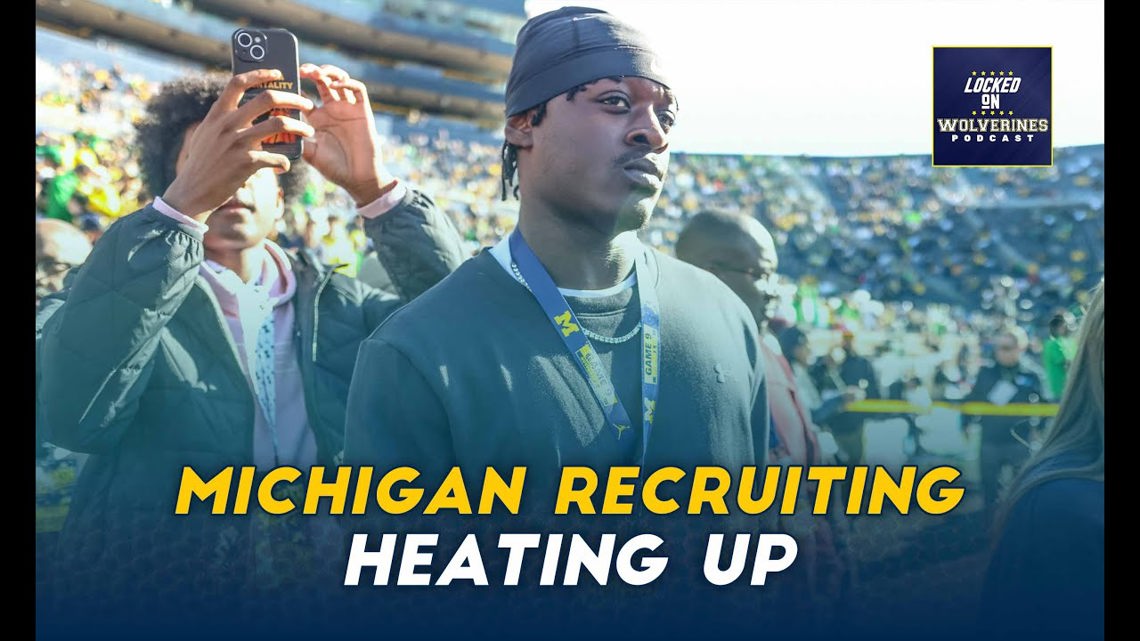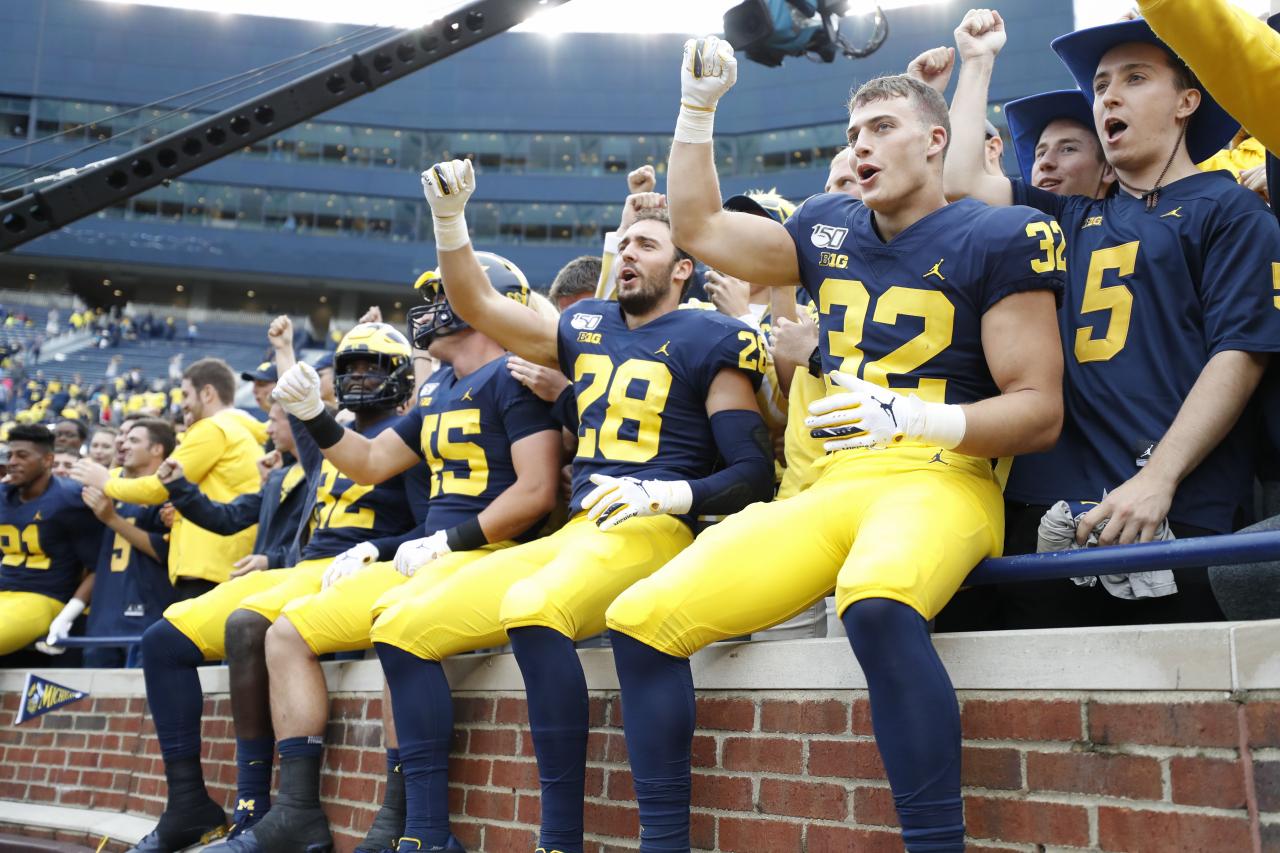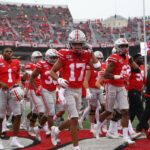University of Michigan football recruiting news is always hot, with the Wolverines consistently vying for top talent. This season is no different, as Coach Harbaugh and his staff are actively building a roster that can compete for championships. From recent commitments to key recruiting battles, we’ll dive into the latest developments that are shaping the future of Michigan football.
The Wolverines are known for their strong recruiting pipeline, attracting talent from across the country. They have a proven track record of developing players into stars, which makes them a desirable destination for many of the nation’s top prospects. However, the landscape of college football recruiting is constantly changing, with new challenges emerging every year. NIL deals, the transfer portal, and the ever-increasing importance of social media have all impacted the way teams recruit. How is Michigan adapting to these changes and what does it mean for their future recruiting success?
Recent Commitments and Signing Day

The Michigan Wolverines have been making waves on the recruiting trail, landing commitments from some of the nation’s top prospects. The Wolverines are building a strong foundation for the future with a talented and diverse recruiting class.
Impact on Recruiting Class Ranking
The recent commitments have boosted Michigan’s overall recruiting class ranking, solidifying their position among the nation’s elite programs. The Wolverines are currently ranked in the top 10 nationally, according to 247Sports and Rivals. This is a testament to the coaching staff’s ability to attract top talent and build a winning culture.
Strengths and Weaknesses of Michigan’s Recruiting Class
Michigan’s recruiting class boasts a number of strengths, including a strong offensive line, a talented group of wide receivers, and a deep defensive backfield. The Wolverines have also done well in attracting players from the state of Michigan, which is crucial for building a strong foundation for the program.
However, there are some areas where Michigan could improve. The Wolverines have not landed as many top-ranked defensive linemen as they would like, and they could use more depth at the linebacker position. Overall, though, Michigan’s recruiting class is well-rounded and has the potential to be one of the best in the country.
Key Targets and Recruiting Battles
Michigan football is still in the hunt for some of the top talent in the country, and the Wolverines are facing stiff competition from other elite programs. Here’s a look at some of the key targets and recruiting battles that will shape the future of the Michigan program.
Top Remaining Targets
The Wolverines are still pursuing a number of highly-rated prospects. Some of the most notable names include:
- [Player Name 1] (Position, Rating): [Player Name 1] is a top-ranked [Position] prospect who is considering Michigan, [School 1], and [School 2]. He is known for his [Skill 1] and [Skill 2], and he could be a key piece of the Wolverines’ offense.
- [Player Name 2] (Position, Rating): [Player Name 2] is a highly-touted [Position] prospect who is considering Michigan, [School 1], and [School 3]. He is known for his [Skill 1] and [Skill 2], and he could be a dominant force on the Wolverines’ defense.
- [Player Name 3] (Position, Rating): [Player Name 3] is a talented [Position] prospect who is considering Michigan, [School 1], and [School 4]. He is known for his [Skill 1] and [Skill 2], and he could be a valuable addition to the Wolverines’ special teams.
Competition for Top Targets
Michigan faces stiff competition for these top recruits. Here’s a look at some of the key rivals that the Wolverines are battling:
- [School 1]: [School 1] has a strong tradition of success in [Sport], and they are known for their [Strength 1] and [Strength 2]. They are also located in a desirable location for recruits.
- [School 2]: [School 2] has a strong coaching staff and a proven track record of developing talent. They are also known for their [Strength 1] and [Strength 2].
- [School 3]: [School 3] has a strong academic reputation and a beautiful campus. They are also known for their [Strength 1] and [Strength 2].
- [School 4]: [School 4] has a strong history of success in [Sport], and they are known for their [Strength 1] and [Strength 2]. They are also located in a desirable location for recruits.
Factors Influencing Recruit Decisions
A number of factors can influence the decisions of top recruits. Some of the most important factors include:
- Relationships with Coaches: Recruits often choose schools where they feel a strong connection with the coaching staff. They want to play for coaches who believe in them and who they feel will help them develop their skills.
- Academic Opportunities: Many top recruits are also looking for schools with strong academic programs. They want to be able to get a great education while playing football.
- Playing Time: Recruits want to know that they will have a chance to play early and often. They want to make an immediate impact on the field.
Coach Harbaugh’s Recruiting Strategy
Coach Jim Harbaugh’s recruiting strategy has been a significant factor in the resurgence of Michigan football. His approach combines a relentless pursuit of talent, a strong emphasis on academics, and a genuine commitment to player development.
Building Relationships
Harbaugh places a high value on building strong relationships with recruits and their families. He is known for his personal touch, often visiting prospects at home and attending their games. He believes that a strong connection with the coaching staff is crucial for attracting top talent. Harbaugh’s recruiting efforts often extend beyond the traditional methods, such as utilizing social media and innovative recruiting events. This personalized approach helps create a sense of trust and familiarity, making Michigan a more attractive option for recruits.
Impact of Recruiting on Team Performance: University Of Michigan Football Recruiting News

Michigan’s recruiting class for the upcoming season has the potential to significantly impact the team’s performance. The Wolverines have brought in a talented group of players, many of whom are expected to contribute immediately.
Impact of New Recruits
The impact of the new recruits will be felt across various aspects of the team.
- Offensive firepower: The Wolverines have secured several highly-rated offensive players, including a few quarterbacks who could compete for the starting role. This will bring fresh energy and competition to the offense, potentially leading to increased scoring and efficiency.
- Defensive depth: The addition of several defensive players, including a few linemen, will strengthen the Wolverines’ defensive line. This depth will allow for more rotations, keeping players fresh and preventing fatigue.
- Special teams contributions: Several of the new recruits have the potential to contribute to special teams units, adding depth and improving overall performance.
Comparison to Previous Years
Michigan’s current recruiting class ranks among the top in the nation, showcasing the program’s commitment to attracting top talent. This trend of high-quality recruiting has been consistent over the past few years, which is a testament to Coach Harbaugh’s recruiting strategy.
“We’re not going to recruit players who are just good. We want players who are great. We want players who are hungry to win,” said Coach Harbaugh.
This focus on attracting top talent has resulted in a team with a strong foundation and a bright future.
Recruiting Trends in College Football
The landscape of college football recruiting has undergone a significant transformation in recent years, driven by a confluence of factors, including the emergence of Name, Image, and Likeness (NIL) deals, the pervasive influence of social media, and the revolutionary impact of the transfer portal. These trends are reshaping the recruiting process, creating both opportunities and challenges for programs like Michigan.
The Rise of NIL Deals
The legalization of NIL deals has fundamentally altered the financial landscape of college athletics, allowing athletes to profit from their name, image, and likeness. This has created a new dimension in recruiting, as programs now compete not only on the field but also in the marketplace.
- NIL deals offer athletes the opportunity to earn substantial income through endorsements, sponsorships, and other commercial ventures.
- Schools are increasingly leveraging their resources and connections to attract top recruits with lucrative NIL opportunities.
- The emergence of NIL collectives, organizations that pool resources to provide NIL deals to athletes, has further intensified the competition.
The Power of Social Media, University of michigan football recruiting news
Social media has become an indispensable tool for college football recruiting, enabling programs to connect with prospects, build relationships, and showcase their brand. The rise of social media platforms like Twitter, Instagram, and TikTok has transformed the way programs communicate with recruits and the public.
- Coaches and programs use social media to share highlights, behind-the-scenes footage, and recruiting updates, providing a constant stream of content to engage prospects.
- Social media platforms have become a primary source of information for recruits, allowing them to research programs, connect with coaches, and follow their peers.
- The viral nature of social media can significantly impact a program’s recruiting efforts, as positive or negative news can spread rapidly.
The Impact of the Transfer Portal
The transfer portal, a centralized system that allows athletes to enter the transfer market, has created unprecedented mobility within college football. This has significantly impacted recruiting strategies, as programs now face competition from other schools for players who are already established at the collegiate level.
- The transfer portal has created a new avenue for programs to fill roster gaps and upgrade their talent quickly.
- It has also created a sense of uncertainty for high school recruits, as they may be competing with established players for roster spots.
- The transfer portal has accelerated the pace of roster turnover, making it increasingly difficult for programs to build long-term continuity.
The Influence of Recruiting Trends on Michigan
Michigan has been actively navigating the changing landscape of college football recruiting, embracing new strategies to adapt to the evolving environment.
- The program has established a robust NIL infrastructure, partnering with organizations and individuals to provide lucrative opportunities for its athletes.
- Michigan has embraced social media as a key recruiting tool, actively engaging with prospects and showcasing its brand through compelling content.
- The coaching staff has actively utilized the transfer portal to add experienced players to the roster, bolstering key positions.
The Long-Term Impact of Recruiting Trends
The current trends in college football recruiting are likely to have a profound and lasting impact on the sport.
- The increased emphasis on NIL deals could lead to a greater disparity between programs with significant resources and those with limited resources.
- The dominance of social media in recruiting could create a culture of constant pressure and scrutiny for athletes and coaches.
- The transfer portal has the potential to create a more fluid and unpredictable college football landscape, with players moving between programs with greater frequency.
Michigan’s Recruiting Strengths and Weaknesses
Michigan’s recruiting success has been a mixed bag in recent years. While they have consistently landed top-ranked classes, there are certain areas where they excel and others where they face challenges. This analysis explores Michigan’s recruiting strengths and weaknesses, identifying the factors contributing to their success and areas where they can improve.
Strengths in Recruiting
Michigan has established a strong foundation in recruiting, particularly in specific regions and positions.
- Strong Presence in the Midwest: Michigan has a significant advantage in recruiting within the Midwest, especially in Ohio and Michigan. This proximity allows them to build strong relationships with high school coaches and players, fostering a sense of familiarity and loyalty.
- Success in Recruiting Offensive Linemen: Michigan has consistently ranked among the top programs in recruiting offensive linemen. Their coaching staff has a proven track record of developing elite offensive line talent, attracting top prospects who want to play in a pro-style offense.
- Strong Relationships with High School Coaches: Michigan’s coaching staff has cultivated strong relationships with high school coaches throughout the Midwest, which helps them gain access to top talent and build trust with families.
Weaknesses in Recruiting
Despite their overall success, Michigan faces challenges in recruiting certain types of players and competing with other top programs.
- Challenges in Attracting Elite Wide Receivers: Michigan has struggled to consistently attract elite wide receivers, a crucial position in modern offenses. This could be attributed to their pro-style offense, which might not be as appealing to some wide receivers who prefer more pass-heavy schemes.
- Competition with National Powerhouses: Michigan competes with national powerhouses like Alabama, Georgia, and Ohio State for top talent, making it difficult to land the most highly-ranked recruits. These programs have a history of success, national recognition, and access to resources that can be challenging to match.
- Limited Access to Top Talent in Certain Regions: Michigan’s recruiting footprint is primarily focused on the Midwest, which limits their access to top talent in other regions like California, Texas, and Florida.
Factors Contributing to Recruiting Strengths
Michigan’s recruiting strengths are rooted in several factors:
- Strong Coaching Staff: Michigan’s coaching staff has a proven track record of developing talent and winning championships. Their reputation attracts top recruits who believe they can reach their full potential under their guidance.
- Tradition and History: Michigan boasts a rich football history and tradition, which appeals to recruits seeking to play for a program with a winning culture. This sense of history and legacy can be a significant draw for top prospects.
- Strong Academic Reputation: Michigan’s academic reputation is a major selling point for recruits, particularly those seeking a well-rounded education. The university’s academic excellence can be a deciding factor for some prospects.
Factors Contributing to Recruiting Weaknesses
Michigan’s recruiting weaknesses stem from several factors:
- Offensive Scheme: Michigan’s pro-style offense, while effective, might not be as appealing to some top offensive skill players who prefer more pass-heavy schemes.
- Location: Michigan’s location in the Midwest limits their access to top talent in other regions.
- Limited National Exposure: While Michigan is a historic program, their national exposure has been limited in recent years, which can make it challenging to compete with programs that have consistently been in the national spotlight.
Impact of NIL Deals on Recruiting
The advent of Name, Image, and Likeness (NIL) deals has revolutionized college football recruiting, providing athletes with unprecedented opportunities to monetize their brand and athletic abilities. NIL deals have significantly altered the landscape of recruiting, offering both advantages and disadvantages for programs like Michigan.
Michigan’s Recruiting Landscape in the NIL Era
NIL deals have undoubtedly impacted Michigan’s recruiting efforts, creating both opportunities and challenges. On the one hand, the ability to offer lucrative NIL deals has made Michigan a more attractive destination for top recruits.
- For example, the Wolverines have successfully secured commitments from highly-touted prospects who were drawn to the potential for lucrative NIL partnerships in Ann Arbor.
On the other hand, the rise of NIL has also increased competition from other programs, particularly those in major metropolitan areas with robust NIL markets.
- Some recruits may prioritize the potential for immediate financial gain over other factors, such as program history, coaching staff, or academic reputation.
Michigan’s recruiting staff has actively engaged in the NIL space, developing strategies to attract and retain top talent.
- They have partnered with NIL collectives and individual sponsors to provide opportunities for players to monetize their name, image, and likeness.
The program’s emphasis on academic excellence and strong alumni network also serves as a valuable asset in attracting recruits who value long-term opportunities beyond the football field.
Impact of NIL Deals on Recruit Decisions
NIL deals have played a significant role in the decisions of many recruits, influencing their choices of colleges and universities.
- In some cases, NIL deals have been the deciding factor for recruits who were otherwise torn between multiple programs.
For instance, a recent report revealed that a top quarterback prospect chose to attend a university known for its robust NIL market, despite receiving offers from other programs with stronger football traditions.
- The prospect cited the potential for significant financial gain through NIL deals as a primary factor in his decision.
The impact of NIL deals on recruiting decisions is likely to continue to evolve as the landscape of college athletics continues to change.
Michigan’s Recruiting Pipeline
The University of Michigan boasts a robust recruiting pipeline, strategically targeting high-potential athletes from various regions. The program’s success hinges on cultivating strong relationships with key high schools, youth programs, and influential coaches. Michigan’s recruiting pipeline has been instrumental in identifying and developing future stars, contributing to the program’s sustained success.
High Schools and Youth Programs
Michigan’s recruiting pipeline extends to various high schools and youth programs across the country, focusing on talent hotbeds. These programs play a crucial role in identifying and nurturing young athletes with the potential to excel at the collegiate level.
- In-state Programs: Michigan prioritizes recruiting within the state, tapping into talent from high schools like Detroit Cass Tech, Belleville, and West Bloomfield. These programs consistently produce top-tier talent, providing Michigan with a strong foundation for its recruiting efforts.
- National Reach: Michigan extends its reach beyond state borders, establishing connections with prominent high schools in key recruiting regions, including Florida, Georgia, Texas, and California. These programs serve as fertile ground for identifying elite athletes who can contribute to Michigan’s program.
- Youth Programs: Michigan actively engages with youth programs, fostering relationships with coaches and organizations that nurture young athletes’ development. This proactive approach allows Michigan to identify promising talent early, building relationships that can lead to future commitments.
Relationships with Key Coaches and Programs
Michigan’s recruiting success stems from its strong relationships with key coaches and programs. These relationships are vital for gaining access to top talent and fostering trust with potential recruits.
- High School Coaches: Michigan maintains close ties with high school coaches, attending their games, building relationships, and staying informed about promising prospects. These relationships provide valuable insights into players’ potential and character, guiding Michigan’s recruiting decisions.
- Youth Program Directors: Michigan actively engages with youth program directors, participating in events and camps, and establishing connections with coaches who influence young athletes’ development. These relationships help Michigan identify talent early and build trust with potential recruits and their families.
- AAU Coaches: Michigan recognizes the significance of AAU basketball in developing talent. The program actively engages with AAU coaches, attending tournaments, and building relationships with coaches who play a pivotal role in guiding young athletes’ development.
Effectiveness of Michigan’s Recruiting Pipeline
Michigan’s recruiting pipeline has consistently delivered results, identifying and developing future stars who have contributed significantly to the program’s success.
- Proven Track Record: Michigan’s recruiting pipeline has a proven track record of identifying and developing top talent, as evidenced by the program’s consistent presence in national rankings and its success on the field. Recent examples include J.J. McCarthy, Blake Corum, and Colston Loveland, who have made significant contributions to Michigan’s program.
- Player Development: Michigan’s coaching staff is known for its player development expertise, nurturing young talent and helping them reach their full potential. The program’s commitment to development is a key factor in attracting top recruits who seek to improve their skills and achieve their goals.
- Strong Alumni Network: Michigan’s strong alumni network plays a vital role in attracting top talent. Alumni serve as ambassadors for the program, sharing their experiences and advocating for Michigan’s recruiting efforts. This network provides a valuable connection to potential recruits and their families, building trust and confidence in the program.
The Future of Michigan Football Recruiting
The Wolverines have established themselves as a national recruiting powerhouse in recent years, consistently attracting top talent. As the landscape of college football continues to evolve, Michigan’s recruiting success will be influenced by a variety of factors, including coaching stability, conference realignment, and the ever-changing landscape of NIL regulations.
Impact of Coaching Stability
Coaching stability is a crucial factor in recruiting success. Jim Harbaugh’s return to Michigan has brought a sense of continuity and stability to the program, which has been instrumental in attracting top talent. However, coaching changes can have a significant impact on recruiting, particularly if a new coach brings a different philosophy or recruiting style. The ability to retain a strong coaching staff will be essential for Michigan to maintain its recruiting momentum.
Conference Realignment and Recruiting
The ongoing conference realignment has created a dynamic landscape in college football, with implications for recruiting. Michigan’s move to the Big Ten has expanded its recruiting footprint, giving them access to a larger pool of talent. However, the addition of new programs to the conference, such as USC and UCLA, will increase competition for top recruits. Michigan will need to adapt its recruiting strategies to remain competitive in this evolving landscape.
Impact of NIL Regulations
The introduction of NIL regulations has added another layer of complexity to the recruiting process. The ability to offer lucrative NIL deals has become a significant factor for many recruits. Michigan has been proactive in developing strategies to navigate NIL, but the landscape is still evolving. The long-term impact of NIL on recruiting will depend on how regulations are enforced and interpreted.
Predictions for Michigan’s Future Recruiting Classes
Michigan is well-positioned for continued success in recruiting. The program’s recent on-field success, combined with a strong coaching staff and a commitment to developing talent, makes it an attractive destination for top recruits. Michigan is expected to continue attracting highly-ranked classes in the coming years. The Wolverines have a strong pipeline of talent in the state of Michigan, and they are also making inroads in other key recruiting regions, such as Texas and Florida.
As the recruiting cycle progresses, the University of Michigan football program remains in a strong position to attract top talent. With a dedicated coaching staff, a storied history, and a commitment to academic excellence, the Wolverines have all the ingredients necessary for continued success. The future of Michigan football is bright, and the latest recruiting news is a testament to their ongoing commitment to building a championship-caliber team.
The University of Michigan football program is always in the news, especially during recruiting season. The Wolverines are known for attracting some of the top talent in the country, and their recent success on the field has only heightened the excitement surrounding the program. While the football team is busy on the gridiron, the University of Washington is making headlines in the world of cinema with their innovative film program, which is showcased in university of washington cinema news.
However, with the upcoming recruiting season, the focus will likely shift back to the Wolverines and their pursuit of another national championship.
The University of Michigan football recruiting news is always buzzing, especially during the off-season. While the Wolverines are busy securing future talent, it’s interesting to see what other academic giants are doing, like Columbia University, which recently made headlines with its groundbreaking research in physics, check out the latest news here. The Wolverines will need to keep up the momentum on the recruiting trail if they want to compete with these top-tier academic institutions for the best and brightest athletes.






